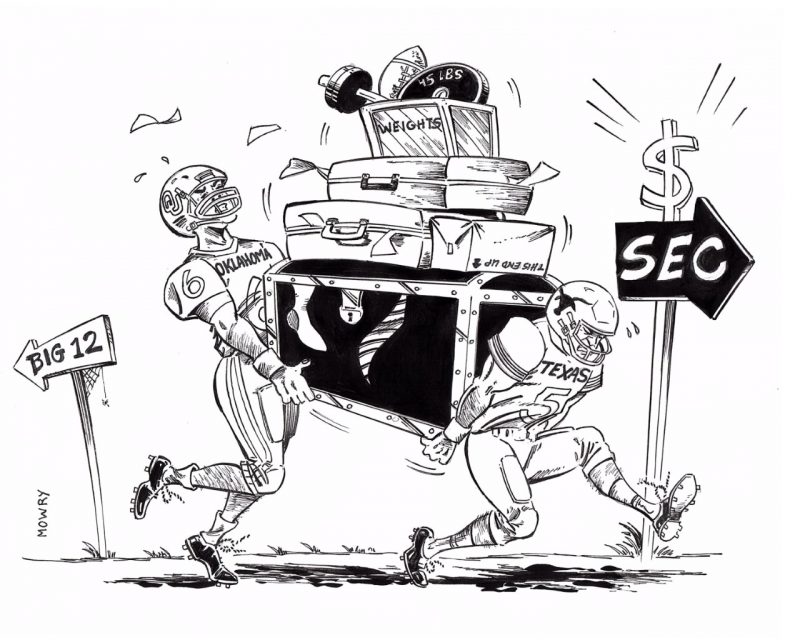If only there were something to write about…
SEC Media Days have now come and gone. As the dog days of summer slowly move along, teams are now beginning what has become the modern-day version of training camp for Southeastern Conference football players. Real exciting stuff.
Through Media Days, we got to see each of the SEC’s football coaches take the podium and chat about their team and the upcoming season. On a couple of occasions, we even got a funny quip from a coach about another team or even another coach in what usually amounts to nothing more than a well-intentioned jab among friends. That’s about as far as any of them are willing to take it in the preseason. (Once the season starts, I’m sure Cousin Eddie will be prepared to go full “Karen-Mode” on someone for the cameras.)

Sometimes I wish that these SEC Media Days would provide more interesting material.
Just Kidding
As you all know by now, water coolers across the south have run low from the number of discussions created by the excitement and drama that has unfolded around the Southeastern Conference in the last two weeks. As usual, the SEC has left the college football world shaken and stirred.
To briefly recap, in a bold and surprising move, the Universities of Texas and Oklahoma reached out to Southeastern Conference officials asking to join the league. Shortly thereafter, the SEC accepted both schools into the conference with open arms – and open wallets.
News of the move was dropped by the Houston Chronicle a few minutes before Jimbo Fisher and Texas A&M were about to take the podium at SEC Media Days. – Good timing, huh? Think Texas had anything to do with that?
- As a side note, I couldn’t help but laugh at the fact that Ross Bjork had no clue this was coming. The former Ole Miss AD was clearly caught off guard when questioned on the topic. “We want to be the only SEC program in the state of Texas,” he stated. A week later, Texas A&M votes to allow Texas and Oklahoma into the SEC. His off-the-cuff responses were a crystal clear indication that he was completely in the dark. Ironically, he sounded just like I remembered when responding to any new information that surfaced during the NCAA’s five-year witch hunt in Oxford. He never seemed to have a clue about what was coming then, either.
The move sent shockwaves through the Big 12. Little did any of them know that their two biggest cash cows were secretly planning an exodus for richer pastures…much richer pastures.
So now that the proverbial cat has been set free, what conclusions are we all to draw as an effect of this disruption in the college football world? More specifically, what does it mean for Ole Miss?
The Root of All Evil
Let’s not beat around the bush here. This entire situation has nothing to do with anything “competitive” or what is “good for college football” or anything else like that. This is all about one thing. One. Single. Thing.
Money.
The powers-that-be at Texas and Oklahoma are clearly fed up with the other eight of the Big 12 and their inability to generate revenue. Even though a move to the SEC would effectively neutralize their competitive advantage, they would no longer have to carry the rest of the conference around by the checkbook. In the SEC, their shares of conference revenue alone would increase from $38.5 million each to what is an estimated $52 million each.
Additionally, they will gain added revenue from half of their home games now being against SEC foes, who will bring thousands upon thousands of fans and millions of dollars to spend in their respective states.
It is quite clear that Texas and Oklahoma are getting big raises.
As significant as the increase in revenue is to Texas and Oklahoma, it pales in comparison to the dollar signs rolling around in Greg Sankey’s eyes right now. The addition of two more marquee programs and a new region to draw viewers/fans from (Oklahoma) only means that the next TV deal is sure to be monumental.
There are estimates that the SEC could surpass the NCAA itself in earnings.
Time for Counting
So what does Ole Miss get out of this?
As it stands, Ole Miss gets about $45.5 million from the SEC each year. Using that number, one could extrapolate that each team’s contribution to that total would be in the neighborhood of $3.25 million. Add two more pieces to the pie and Ole Miss’ take would increase to around $52 million.
Wow. A $6.5 million dollar raise. That’s a pretty good chunk of change.
In addition to the SEC money, putting these two schools on the football schedule every season would likely increase home game revenues as well. In Ole Miss’ case, a single game’s revenue could increase by several million dollars. This is huge to a smaller school like Ole Miss.
So this all makes perfect sense now, right? The amount of money we’re talking about is going to drive huge changes to the overall conference landscape. Ole Miss will be competing for the National Championship in football every year now that we have this additional money! Awesome!
Hold up.
If the overall pot of money increases, aren’t the other teams in the conference going to get the same increase that Ole Miss will be getting? – Hell yes. No advantage there.
Also, if Ole Miss adds these two schools to the schedule, won’t we have to drop two other SEC games to create space to fit the new games? – Damn right. No advantage there, either.
Is the Dealing Done?
So if the money isn’t going to put Ole Miss in position to be more competitive, why are we agreeing to this?
The answer is that no one knows.
Surely it is hard for the administration to turn the money down, but to what end have we agreed to this deal? We’ve now assisted the most powerful conference in college football in gaining even more power. How did this deal make us better, though? What’s our end game here?
For the life of me, I just can’t figure it out.
I’m going to give myself a week or so to let this all sink in. I have been very critical of Ole Miss’ (lack of) leadership in the past, especially regarding their propensity to allow us to be pushed around by those who don’t have the best interests of our school at heart. I hope this doesn’t turn out to be more of the same.
We’ll finish counting…”when the dealin’s done.” – KR


